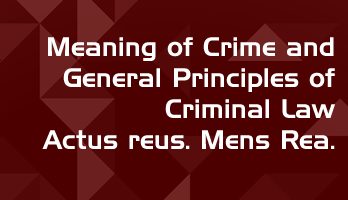Free Full Course Available on LawMint's YouTube Channel
How to Land Your Dream LLB Internship in a Top Law Firm
- Part 1 - Introduction
- Part 2 - Internship Planning
- Part 3 - Internship Research
- Part 4 - Building Your Profile
- Part 5 - The Email
- Part 6 - The Resume
- Part 7 - The Cover Letter
- Part 8 - The Interview
- Part 9 - Self Development
Practical and comprehensive course, with real examples and step-by-step analysis of the complete internship application process. Check out LawMint's YouTube channel now!
Role of ‘Custom’ in Jewish Law
Jews are a small community in India who follow the religion of ‘Judaism’. The main sources of Jewish law are the provisions of the ‘Mosaic Code’, set forth in the ‘Pentateuch’, which existed in the earliest times of Judaism and which is repeated with some modifications in “Deuteronomy”.
The Mosaic Code has a well-founded historical importance, and with subsequent adaptations to changed conditions of life, has affected the domestic life of the Jewish people all over the world. The later provisions of Jewish law are laid down in the “Talmud”, a work which contains the traditional laws of the Hebrews. The marital law laid down in the ‘Talmud’ is an interpretation and enlargement of the Mosaic Code.
It is divided into the “Mishna” and the “Gemara”, the former of which contains the laws governing almost every action of the Hebrews, and the latter contains commentaries or expositions and discussions upon those laws. In the Middle Ages, statements of Jewish law were derived from the institutions of the ‘Rabbis’, but the principles of the old Rabbinical Code have been considerably modified in order that they may conform to the requirement of the laws of different countries in the world.
The Rabbi himself is no longer a civil judge, but only a spiritual guide and preceptor of his congregation. In the Middle Ages, codes were compiled from the ‘Talmud’ for practical use, and the law was codified in the sixteenth century in a work styled “Schulchan Aruch” of which the third part, the ‘Eben Ha-Ezer’, contains the matrimonial laws of the Jewish people and has obtained a general authority on all questions of marriage and divorce.
The origins of Indian Jews remain uncertain, but according to some accounts they may have come as emissaries from the Court of King Solomon. When the kingdom of Judaea was annihilated by the Roman Emperor Vespasian in the year 70 A.D., the Jews started migrating to almost all parts of the world.
Jews in India can be broadly classified into three categories:
(a) the Cochin Jews, who arrived in India around 2500 years ago and settled down in Kerala as traders,
(b) Bene Israel Jews, who arrived in India around 2100 years ago and settled in the states of Maharashtra and Gujarat,
(c) Baghdadi Jews, who arrived in the late 18th century from Iraq, Iran, and Afghanistan and settled in Mumbai and Kolkata.
They established their own small communities and built places of meeting and prayers called ‘synagogues’, read the holy Bible, and observed Sabbath and circumcision.
It is interesting to know that the Bene Israel community, which is the largest Jewish community in India, believes that their forefathers were shipwrecked on India’s shore while fleeing persecution during the second century B.C.
Custom Relating to Jewish Marriage
The Jewish customary practice on marriage is different from the Christians and English people. The Roman Catholic Church considers marriage as a sacrament and as such indissoluble. Under English law, marriage is looked upon as a contract.
Jewish law regards marriage not only as a civil contract, but as a relation between two persons involving very sacred duties. In the Mosaic laws, no fixed forms of concluding marriage are mentioned, but there is a distinction between the betrothed woman and the married woman.
The betrothed woman was called ‘Arusha’, and the married woman ‘Nissua’. This practice was further evolved into certain legal formalities, and the act of marriage came to consist of two different parts, namely, the betrothment and the nuptials. A girl under the Jewish custom does not become betrothed unless the betrothal takes place with her consent.
A girl who is a minor under the Hebrew law, that is to say, if she is below the age of thirteen years and a day, cannot betroth herself. The consent of the man is also necessary. The mere consent, however, of parties to marry each other is not sufficient to constitute a betrothal, because a certain act or formality is required by which the mutual consent is legally manifested.
For this purpose, there are two special formalities. One of them is called ‘Kaseph’ (money), the other Sh’tar (written instrument). The betrothal by ‘Kaseph’ called ‘Kaseph Kiddushim’ consists in the man giving in the presence of two witnesses to the girl an amount of money or any other object of equal value, and at the same time saying in Hebrew, “Be thou consecrated to me”, or “Be my wife”, or “Be Mine” according to the laws of Moses and Israel. The witnesses must also be Jews.
Divorce in Indian Jewish Personal Laws
The betrothment can only be dissolved through death or a formal bill of divorcement. Jewish customary law recognizes divorce.
Four kinds of divorce were recognized by the old Rabbinical law:
- (a) divorce by mutual agreement,
- (b) divorce enforced upon the wife on the petition of the husband,
- (c) divorce enforced upon the husband on the petition of the wife,
- (d) divorce enforced by the Jewish court without the petition of either of the parties.
A woman can ask for the bill of divorcement either after betrothal or marriage. The bill of divorcement has to be executed by the person who gives divorce to the person who has asked for it.
Custom Relating to Jewish Succession & Inheritance
Similarly, the customary practices of the Jews in matters of succession and inheritance are regulated by the ‘Pentateuch’ (religious text mentioned before) and by the Conciliation Committees formed by the Jews in their settlements.
When the law related to succession was codified during the British regime, and was named as Indian Succession Act, 1925, the Jews did not say anything upon its application upon them.
When some of the Jews discovered that the new law was not in consonance with their customary practices based on “Pentateuch”, they petitioned to the State Government which has the power to exempt any race, sect or tribe from the operation of the Act. The British Government conceded this demand, and the Jews were remitted to the ‘Pentateuch’.
Role of Legislation and Judicial Precedents in Jewish Law
Law on Jewish Marriage and its Judicial Review
There is no specific legislation for the marriages amongst the Jews in India, so the role of legislation has absolutely no significance. Unlike in the case of Christians, Parsis and Hindus, as also in the case of Muslim women, there is also no statute providing for any matrimonial relief, such as divorce and alimony.
However, judicial precedents have helped Jewish law to evolve in India for a long time. In this section, we will give full focus on the role of judicial precedents in shaping Jewish law in India.
The Bombay High Court judgments have played a major role in developing Jewish law in India. For example, this Court has established the rule that the nature and incidence of a Jewish marriage and the matrimonial relief to which a Jewish husband or wife would be entitled, must be ascertained from their personal law (Mozelle Robin Solomon v. Lt. Col. R.J. Solomon).
Matrimonial disputes, such as seeking divorce can also be settled by the Courts. The law to be applied in such cases is the Jewish law with such adaptations to the circumstances of the case as justice may require. In the event of any dispute, the custom of the Jewish community will be considered before any ruling on the matter may be pronounced (Rachel Benjamin v. Benjamin Solomon Benjamin).
Recognizing one of the Jewish customs, the Bombay High Court held that where a Jewish girl (Baghdadi Jew) went through betrothal ceremony, called Kaseph Kiddushim (it is one of the two steps of marriage, the other step being “Chuppah”), the girl may be entitled to get the betrothal cancelled if the conditions of betrothal have not been fulfilled by the boy or the groom.
Betrothal ceremony amongst Jews confers some of the rights and obligations of the married state. When the betrothal becomes void on non-fulfilment of its conditions, there is no need to execute a bill of divorcement to nullify the effect of the Kaseph Kiddushim ceremony (David Sassoon Ezekiel v. Najia Noori Reuben).
The girl can marry another Jewish boy without getting a bill of divorcement from the earlier boy with whom she was betrothed.
In an interesting case of divorce, a Jewish husband filed a petition in the Mumbai High Court seeking divorce on two grounds: (a) obstinate refusal of conjugal rights during one whole year (b) insulting the father-in-law in the presence of the husband and insulting the husband himself.
Since there was some uncertainty about the exact law applicable on the question of divorce claimed by the husband, the Court referred to Jewish customary practice in England and the U.S.A. as mentioned in a book written by Rev, M. Mielziner on the Jewish Law of Marriage and Divorce in ancient and modern times.
In modern times, these grounds of divorce are called
- (a) desertion
- (b) cruelty.
In this case, the Court found that the wife had not obstinately refused to cohabit as before and after the time in which cohabitation was not alleged, it was found that they had cohabited with each other. On the second ground also, the Court held that the wife had not insulted her father-in-law, rather she wanted to assert her views.
When a wife speaks up in front of her father-in-law and husband, it does not amount to cruelty (Bension Joseph Hayeema v. Sharon Bension Hayeema).
Law on Jewish ‘Will’
The Court has also examined the Jewish law on ‘will’ by which a person can transfer his property according to his own wishes to others. It was held that the subject matter of a gift or a ‘will’ must be definite, existing, and in possession. No uncertain or future property can validly form the subject of a gift or a ‘will’.
For example, a share of a share in a partnership property is indefinite. Delivery of the document containing the ‘will’ to the donee is essential in order to complete the transaction.
A ‘will’ must be read or the contents thereof explained to the donee or the legatee or some of his agent. If any of these essential requirements is not complied with or observed, the ‘will’ cannot be enforced by the court (Menahem Mesha v. Moses Bunin Menahem Messa).
Questions
List down a few matrimonial customs of Jews in India
The Matrimonial Customs of the Jews in India are :
(a) marriage is regarded as a civil contract as well as a sacred commitment to perform some duties;
(b) a betrothed and married woman are two distinct phases and each one has a different meaning;
(c) four kinds of divorce are practiced; and
(d) mere consent of parties to marry is not enough, some legal formalities are necessary to be observed, such as ‘Kaseph Kiddushim’
Free Full Course Available on LawMint's YouTube Channel
How to Land Your Dream LLB Internship in a Top Law Firm
- Part 1 - Introduction
- Part 2 - Internship Planning
- Part 3 - Internship Research
- Part 4 - Building Your Profile
- Part 5 - The Email
- Part 6 - The Resume
- Part 7 - The Cover Letter
- Part 8 - The Interview
- Part 9 - Self Development
Practical and comprehensive course, with real examples and step-by-step analysis of the complete internship application process. Check out LawMint's YouTube channel now!
Acknowledgement : This article is adapted from Swayam – NIOS course material.












